Model differences
Moto Guzzi V700, V7 Special, Ambassador, 850 GT, 850 GT California, Eldorado, and 850 California Police models
Created:
Updated:
Like most things in life, these differences are not absolute. There was plenty of crossover as the models evolved and there are many exceptions. But, this can serve as a general guideline to the differences between V700, V7 Special, Ambassador, 850 GT, 850 GT California, Eldorado, and 850 California Police models. Some of the photos and information came from Dave Otis' old website. I'm certain I missed something, so please contact me with any corrections, contributions, or additional photos: greg@thisoldtractor.com.
Special thanks to Mike Tiberio, Rob Prins, Newtin, Paul Linn, Charlie Mullendore of Antietam Classic Cycle, Gordon Kline of MG Cycle, Sven Stepan, and Marty Ray for providing additional difference information.
| V700 | V7 Special | Ambassador | 850 GT | 850 GT California | Eldorado | 850 California Police | |
|---|---|---|---|---|---|---|---|
| Imported into the United States directly from the factory |
Yes |
No |
Yes |
No |
No |
Yes |
Yes |
| V700 | V7 Special | Ambassador | 850 GT | 850 GT California | Eldorado | 850 California Police | |
| Engine Case |
3 shallower vertical ribs  Photo courtesy of Dave Otis. |
Most had 3 deeper vertical ribs plus additional diagonal rib running rearward from cylinder base  Photo courtesy of Dave Otis. Very late had horizontal webbing  Photo courtesy of Dave Otis. |
Horizontal webbing  Photo courtesy of Dave Otis. |
||||
| V700 | V7 Special | Ambassador | 850 GT | 850 GT California | Eldorado | 850 California Police | |
| Bore |
80 mm |
83 mm |
|||||
| V700 | V7 Special | Ambassador | 850 GT | 850 GT California | Eldorado | 850 California Police | |
| Stroke |
70 mm |
78 mm |
|||||
| V700 | V7 Special | Ambassador | 850 GT | 850 GT California | Eldorado | 850 California Police | |
| Displacement |
703.717 cc |
757.486 cc |
844.05 cc |
||||
| V700 | V7 Special | Ambassador | 850 GT | 850 GT California | Eldorado | 850 California Police | |
| Piston rings |
4, 3 above wrist pin, 1 below |
4, all above wrist pin |
3, all above wrist pin |
||||
| V700 | V7 Special | Ambassador | 850 GT | 850 GT California | Eldorado | 850 California Police | |
| Valves |
38 mm intake and 34 mm exhaust |
40 mm intake and 35 mm exhaust |
|||||
| V700 | V7 Special | Ambassador | 850 GT | 850 GT California | Eldorado | 850 California Police | |
| Valve springs |
Single |
Dual |
|||||
| V700 | V7 Special | Ambassador | 850 GT | 850 GT California | Eldorado | 850 California Police | |
| Compression Ratio |
9:1 |
9.2:1 |
|||||
| V700 | V7 Special | Ambassador | 850 GT | 850 GT California | Eldorado | 850 California Police | |
| Maximum RPM |
6000 |
6500 |
|||||
| V700 | V7 Special | Ambassador | 850 GT | 850 GT California | Eldorado | 850 California Police | |
| Horsepower at maximum RPM (SAE) |
50 |
60 |
64 |
||||
| V700 | V7 Special | Ambassador | 850 GT | 850 GT California | Eldorado | 850 California Police | |
| Cylinder head exhaust port |
No boss for future exhaust studs  Photo courtesy of Charlie Mullendore of Antietam Classic Cycle. |
Early models had no boss for future exhaust studs; later models had a boss for later exhaust studs  Photo courtesy of Charlie Mullendore of Antietam Classic Cycle. |
Most had no boss for future exhaust studs; Some had a boss for later exhaust studs  Photo courtesy of Charlie Mullendore of Antietam Classic Cycle. |
||||
| V700 | V7 Special | Ambassador | 850 GT | 850 GT California | Eldorado | 850 California Police | |
| Cylinder head top stud |
One piece design with o-ring  Photo courtesy of Charlie Mullendore of Antietam Classic Cycle. |
Early models had one piece design with o-ring; later models had two piece design with crush washer  Photo courtesy of Charlie Mullendore of Antietam Classic Cycle. |
Two piece design with crush washer  Photo courtesy of Charlie Mullendore of Antietam Classic Cycle. |
||||
| V700 | V7 Special | Ambassador | 850 GT | 850 GT California | Eldorado | 850 California Police | |
|
Cylinder head valve guide casting Thanks to Gordon Kline of MG Cycle for providing this difference information. |
Valve guide casting is proud of the top of the cylinder head. 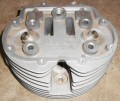 Photo courtesy of eBay auction. |
Valve guide casting is level with the top of the cylinder head. 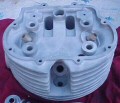 Photo courtesy of eBay auction. |
|||||
| V700 | V7 Special | Ambassador | 850 GT | 850 GT California | Eldorado | 850 California Police | |
|
Valve covers Thanks to Charley Cole of Zydeco Racing for providing some of this difference information. |
Early models had  Photo courtesy of eBay auction. Later models had  Photo courtesy of eBay auction. |
 Photo courtesy of eBay auction. |
Early models had  Photo courtesy of eBay auction. Later models had 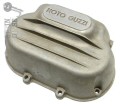 Photo courtesy of Stein Dinse.  Photo courtesy of Stein Dinse.  Photo courtesy of Rob Anderson. |
||||
| V700 | V7 Special | Ambassador | 850 GT | 850 GT California | Eldorado | 850 California Police | |
| Gas tank - capacity |
4.5 gallon |
early models had 4.5 gallon late models had 5.84 gallon |
5.84 gallon |
||||
| V700 | V7 Special | Ambassador | 850 GT | 850 GT California | Eldorado | 850 California Police | |
| Gas tank - petcock position |
Petcocks positioned forward  Photo courtesy of eBay auction. |
Early models had petcocks positioned forward  Photo courtesy of eBay auction. Late models had petcocks positioned rearward  Photo courtesy of eBay auction. |
Petcocks positioned rearward  Photo courtesy of eBay auction. |
||||
| V700 | V7 Special | Ambassador | 850 GT | 850 GT California | Eldorado | 850 California Police | |
|
Gas tank - tunnel width Thanks to Karl Kologiski for providing this difference information. Note: Wider tunnel tanks will fit on the earlier models. Narrow tunnel tanks will not fit on the later models. |
Narrow tunnel  Photo courtesy of eBay auction. |
Early models had narrow tunnel  Photo courtesy of eBay auction. Late models had wider tunnel  Photo courtesy of eBay auction. |
Wider tunnel  Photo courtesy of eBay auction. |
||||
| V700 | V7 Special | Ambassador | 850 GT | 850 GT California | Eldorado | 850 California Police | |
| Gas cap |
Cap with lever, lever secured via special boss on tank  Photo courtesy of Charlie Mullendore of Antietam Classic Cycle. |
Early civilian models had cap with lever, lever secured via special boss on tank  Photo courtesy of Charlie Mullendore of Antietam Classic Cycle. Later civilian models had a cap with a lever, lever secure via ring and groove on neck  Photo courtesy of Charlie Mullendore of Antietam Classic Cycle. Police models had a screw-on cap, taller neck  Photo courtesy of Charlie Mullendore of Antietam Classic Cycle. |
Push button release style, like was fitted to the 850 T |
screw-on cap, taller neck  Photo courtesy of Charlie Mullendore of Antietam Classic Cycle. |
Civilian models had a cap with a lever, lever secured via ring and groove on neck  Photo courtesy of Charlie Mullendore of Antietam Classic Cycle. Police models had a screw-on cap, taller neck  Photo courtesy of Charlie Mullendore of Antietam Classic Cycle. |
Screw-on cap, taller neck  Photo courtesy of Charlie Mullendore of Antietam Classic Cycle. |
|
| V700 | V7 Special | Ambassador | 850 GT | 850 GT California | Eldorado | 850 California Police | |
| Front brakes |
most had twin leading shoe some very late models had four leading shoe (circa 1977) |
twin leading shoe |
most had twin leading shoe some in 1973 had four leading shoe late 1973 and 1974 had single disk |
||||
| V700 | V7 Special | Ambassador | 850 GT | 850 GT California | Eldorado | 850 California Police | |
| Forks |
Early models were fit with a two leading shoe front brake. These models used fork lowers with a single retainer for the brake plate (on the left fork lower). These early fork lowers only used an axle pinch bolt on the left fork lower. The right fork lower did not have a pinch bolt for the axle. Very late models (circa 1977) were fit with four leading shoe front brakes. These models used fork lowers with a retainer on each side for the the pair of brake plates. |
Some models were fit with a two leading shoe front brake. These models used fork lowers with a single retainer for the brake plate (on the left fork lower). These fork lowers used an axle pinch bolt on both the left and right fork lowers. Some models were fit with four leading shoe front brakes. These models used fork lowers with a retainer on each side for the the pair of brake plates (a right side fork lower from a two leading shoe front brake is identical in all other respects). These fork lowers used an axle pinch bolt on both the left and right fork lowers. |
Some models were fit with a two leading shoe front brake. These models used fork lowers with a single retainer for the brake plate (on the left fork lower). These fork lowers used an axle pinch bolt on both the left and right fork lowers. Some models were fit with four leading shoe front brakes. These models used fork lowers with a retainer on each side for the the pair of brake plates (a right side fork lower from a two leading shoe front brake is identical in all other respects). These fork lowers used an axle pinch bolt on both the left and right fork lowers. Some models were fit with single disc brake. These models used entirely different forks with completely different components. |
||||
| V700 | V7 Special | Ambassador | 850 GT | 850 GT California | Eldorado | 850 California Police | |
| Rake |
27° |
||||||
| V700 | V7 Special | Ambassador | 850 GT | 850 GT California | Eldorado | 850 California Police | |
| Trail |
56.94 mm |
81.94 mm |
|||||
| V700 | V7 Special | Ambassador | 850 GT | 850 GT California | Eldorado | 850 California Police | |
| Triple tree offset |
90 mm  Photo courtesy of Dave Otis.  Photo courtesy of Gerhard Ziesemann. |
70 mm  Photo courtesy of Dave Otis.  Photo courtesy of Gerhard Ziesemann. |
|||||
| V700 | V7 Special | Ambassador | 850 GT | 850 GT California | Eldorado | 850 California Police | |
| Triple tree offset for use with side cars |
Information from Gerhard Ziesemann:
Thanks to Patrick Buss for posting these photos on Facebook. I believe the part number for the matching lower triple tree is MG# 12494270.  Photo courtesy of Patrick Buss.  Photo courtesy of Patrick Buss.  Photo courtesy of Patrick Buss.  Photo courtesy of Patrick Buss.  Photo courtesy of Patrick Buss. 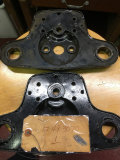 Photo courtesy of Patrick Buss. 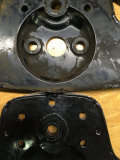 Photo courtesy of Patrick Buss. 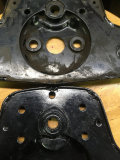 Photo courtesy of Patrick Buss. 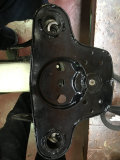 Photo courtesy of Patrick Buss.  Photo courtesy of Patrick Buss. |
||||||
| V700 | V7 Special | Ambassador | 850 GT | 850 GT California | Eldorado | 850 California Police | |
| Transmission speeds |
4 speed |
5 speed |
|||||
| V700 | V7 Special | Ambassador | 850 GT | 850 GT California | Eldorado | 850 California Police | |
| Transmission gear ratios |
1:2.230 1:1.333 1:0.954 1:0.750 |
1:2.000 1:1.388 1:1.047 1:0.869 1:0.750 |
|||||
| V700 | V7 Special | Ambassador | 850 GT | 850 GT California | Eldorado | 850 California Police | |
| Transmission case |
Smooth |
Ribbed |
|||||
| V700 | V7 Special | Ambassador | 850 GT | 850 GT California | Eldorado | 850 California Police | |
| Transmission gear design |
Earliest all straight cut, middle first straight cut/second-fourth helically cut, latest all helically cut |
All helically cut |
|||||
| V700 | V7 Special | Ambassador | 850 GT | 850 GT California | Eldorado | 850 California Police | |
| Clutch push rod |
Larger overall diameter and stepped down where it interfaces with the inner body of the bearing.  Photo courtesy of Arthur Dmochowski.  Photo courtesy of Arthur Dmochowski. |
Smaller overall diameter and not stepped down.  Photo courtesy of Arthur Dmochowski.  Photo courtesy of Arthur Dmochowski. |
Smaller overall diameter and not stepped down.  Photo courtesy of Arthur Dmochowski.  Photo courtesy of Arthur Dmochowski. |
||||
| V700 | V7 Special | Ambassador | 850 GT | 850 GT California | Eldorado | 850 California Police | |
| Rear drive gearing |
8/37 |
8/35 |
8/37 |
||||
| V700 | V7 Special | Ambassador | 850 GT | 850 GT California | Eldorado | 850 California Police | |
| Rear drive case |
Star burst, polished |
Star burst, polished very late may have had the deeper sump, unpolished |
Deeper sump, unpolished |
||||
| V700 | V7 Special | Ambassador | 850 GT | 850 GT California | Eldorado | 850 California Police | |
| Overall gear ratios (from engine through transmission to rear drive) |
1:14.180 1:8.473 1:6.063 1:4.768 |
1:13.413 1:8.015 1:5.735 1:4.510 |
1:11.424 1:7.929 1:5.980 1:4.964 1:4.284 |
||||
| V700 | V7 Special | Ambassador | 850 GT | 850 GT California | Eldorado | 850 California Police | |
| Carburetors |
Dellorto SS1 29mm later models had an intake liner to increase air flow velocity |
Dellorto VHB 29mm |
Dellorto VHB 29mm Some were fitted with Amal 930 carburetors while the Dellorto factory was on strike. |
||||
| V700 | V7 Special | Ambassador | 850 GT | 850 GT California | Eldorado | 850 California Police | |
| Carburetor body to intake manifold clamps |
Smooth polished aluminum band  Photo courtesy of Charlie Mullendore of Antietam Classic Cycle. |
Early models had smooth polished aluminum band  Photo courtesy of Charlie Mullendore of Antietam Classic Cycle. Later models had steel bands perpendicular to the carb body  Photo courtesy of Charlie Mullendore of Antietam Classic Cycle. |
Steel bands perpendicular to the carb body  Photo courtesy of Charlie Mullendore of Antietam Classic Cycle. |
||||
| V700 | V7 Special | Ambassador | 850 GT | 850 GT California | Eldorado | 850 California Police | |
| Shifter design |
Most had heel-toe, few had toe only |
Heel-toe |
|||||
| V700 | V7 Special | Ambassador | 850 GT | 850 GT California | Eldorado | 850 California Police | |
| Shifter location |
Right side, had a different bend to clear the swing arm nut  Photo courtesy of Charlie Mullendore of Antietam Classic Cycle. |
Left side |
|||||
| V700 | V7 Special | Ambassador | 850 GT | 850 GT California | Eldorado | 850 California Police | |
| Rear brake design |
Aluminum  Photo courtesy of Charlie Mullendore of Antietam Classic Cycle. |
Chrome plated steel  Photo courtesy of eBay auction. |
|||||
| V700 | V7 Special | Ambassador | 850 GT | 850 GT California | Eldorado | 850 California Police | |
| Rear brake plate |
Shaft at 12 o'clock, shoe pivot doubles as tie rod attachment point  Photo courtesy of Charlie Mullendore of Antietam Classic Cycle. |
Early had shaft at 12 o'clock, shoe pivot doubles as tie rod attachment point  Photo courtesy of Charlie Mullendore of Antietam Classic Cycle. Later had shaft at 3 o'clock  Photo courtesy of Charlie Mullendore of Antietam Classic Cycle. |
Shaft at 3 o'clock  Photo courtesy of Charlie Mullendore of Antietam Classic Cycle. |
||||
| V700 | V7 Special | Ambassador | 850 GT | 850 GT California | Eldorado | 850 California Police | |
| Rear brake location |
Left side |
Right side |
|||||
| V700 | V7 Special | Ambassador | 850 GT | 850 GT California | Eldorado | 850 California Police | |
| Shift pattern |
1 up, 3 down |
1 up, 4 down |
|||||
| V700 | V7 Special | Ambassador | 850 GT | 850 GT California | Eldorado | 850 California Police | |
| Headlight |
Deep shell |
Shallow shell |
|||||
| V700 | V7 Special | Ambassador | 850 GT | 850 GT California | Eldorado | 850 California Police | |
| Tail light |
Very early models used an entirely unique tail light which is exceedingly rare. 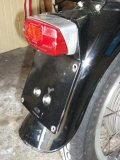 Photo courtesy of Sven Stepan. 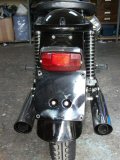 Photo courtesy of Sven Stepan. 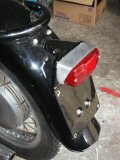 Photo courtesy of Sven Stepan. Later models had additional horizontal mount to the frame, round lens  Photo courtesy of Charlie Mullendore of Antietam Classic Cycle. |
Early models had additional horizontal mount to the frame, round lens  Photo courtesy of eBay auction. Later models lacked additional mount, round lens  Photo courtesy of eBay auction. |
Early models lacked additional mount, round lens  Photo courtesy of eBay auction. Later models had a rectangular lens  Photo courtesy of eBay auction. |
||||
| V700 | V7 Special | Ambassador | 850 GT | 850 GT California | Eldorado | 850 California Police | |
| Instrument panel |
Civilian models only had a speedometer See civilian and police variations here |
Early civilian models only had a speedometer; later civilian models had speedometer and tachometer See civilian and police variations here |
Civilian models had speedometer and tachometer See civilian and police variations here |
||||
| V700 | V7 Special | Ambassador | 850 GT | 850 GT California | Eldorado | 850 California Police | |
| Battery covers |
Narrow, non louvered |
Early models had narrow, non louvered; later models had wider, louvered |
Wider, louvered |
||||
| V700 | V7 Special | Ambassador | 850 GT | 850 GT California | Eldorado | 850 California Police | |
| Tool boxes |
Knobs  Photo courtesy of Charlie Mullendore of Antietam Classic Cycle. |
Early models had knobs Later models had locks  Photo courtesy of Charlie Mullendore of Antietam Classic Cycle. |
Locks  Photo courtesy of Charlie Mullendore of Antietam Classic Cycle. |
||||
| V700 | V7 Special | Ambassador | 850 GT | 850 GT California | Eldorado | 850 California Police | |
| Coil |
Early models had Magneti Marelli; later models had Bosch |
||||||
| V700 | V7 Special | Ambassador | 850 GT | 850 GT California | Eldorado | 850 California Police | |
| Coil mount |
Across the frame |
In line with frame |
|||||
| V700 | V7 Special | Ambassador | 850 GT | 850 GT California | Eldorado | 850 California Police | |
| Civilian frame |
Narrower backbone (later tank will fit on earlier frame, but not vice versa) |
Wider backbone |
|||||
| V700 | V7 Special | Ambassador | 850 GT | 850 GT California | Eldorado | 850 California Police | |
| Police frame (in addition to civilian frame differences) |
Siren mount (mechanical sirens had different mounts than electrical - not sure of difference???), stronger gusset plate for seat, gusset plate drilled for rear crash bars, dimple in rear fender mount at the rearmost part of the frame |
||||||
| V700 | V7 Special | Ambassador | 850 GT | 850 GT California | Eldorado | 850 California Police | |
| Generator |
Early models had Magneti Marelli, later models had Bosch |
||||||
| V700 | V7 Special | Ambassador | 850 GT | 850 GT California | Eldorado | 850 California Police | |
| Generator covers |
Two individual metal plates (most painted, there is some debate as to whether or not some were chromed)  Photo courtesy of Charlie Mullendore of Antietam Classic Cycle. |
Early models had two individual metal plates (most painted, there is some debate as to whether or not some were chromed)  Photo courtesy of Charlie Mullendore of Antietam Classic Cycle. Later models had a single black plastic cover  Photo courtesy of Charlie Mullendore of Antietam Classic Cycle. |
Single black plastic cover  Photo courtesy of Charlie Mullendore of Antietam Classic Cycle. |
||||
| V700 | V7 Special | Ambassador | 850 GT | 850 GT California | Eldorado | 850 California Police | |
| Regulator |
Early models had Magneti Marelli; later models had Bosch |
||||||
| V700 | V7 Special | Ambassador | 850 GT | 850 GT California | Eldorado | 850 California Police | |
| Starter |
Early models had Magneti Marelli; later models had Bosch |
||||||
| V700 | V7 Special | Ambassador | 850 GT | 850 GT California | Eldorado | 850 California Police | |
| Center stand |
Short feet, deployment arm only on one side  Photo courtesy of Arthur Dmochowski. |
Early models had short feet, deployment arm only on one side; later models had long curved feet, deployment arm on both sides  Photo courtesy of Arthur Dmochowski. |
Long curved feet, deployment arm on both sides  Photo courtesy of Arthur Dmochowski. |
||||
| V700 | V7 Special | Ambassador | 850 GT | 850 GT California | Eldorado | 850 California Police | |
| Turn signals |
None |
Front and rear |
|||||
| V700 | V7 Special | Ambassador | 850 GT | 850 GT California | Eldorado | 850 California Police | |
| Fender reflectors |
None |
Early models had none; later models has reflectors with wide chrome trim; some very late models had reflectors with very narrow trim |
Early models had reflectors with wide chrome trim; later models had reflectors with very narrow trim |
||||
| V700 | V7 Special | Ambassador | 850 GT | 850 GT California | Eldorado | 850 California Police | |
| Fork covers / headlight ears |
Shorter |
Shorter for all drum brake models. Disc brake models are longer. |
|||||
| V700 | V7 Special | Ambassador | 850 GT | 850 GT California | Eldorado | 850 California Police | |
| Swing arm |
Aluminum cap on the back end of the swing arm...just before the rear drive |
Boss that could be drilled for aluminum cap |
No boss. |
||||
| V700 | V7 Special | Ambassador | 850 GT | 850 GT California | Eldorado | 850 California Police | |
| Hand levers |
Smooth lever with a perch that angled toward the handlebar  Photo courtesy of eBay auction. |
Early models used a smooth lever with a perch that angled toward the handlebar  Photo courtesy of eBay auction. Later models used a finger-grooved lever with a perch that was more square to the handlebar  Photo courtesy of eBay auction. |
Finger-grooved lever with a perch that was more square to the handlebar  Photo courtesy of eBay auction. Models with 4 leading shoe front brakes used a finger-grooved lever with a special adapter to connect both front brake cables  Photo courtesy of eBay auction. |
||||
| V700 | V7 Special | Ambassador | 850 GT | 850 GT California | Eldorado | 850 California Police | |
Shocks Thanks to Newtin for providing this difference information. Note: the shocks must be completely disassembled to remove the chrome cover; the plastic cover can be distorted to clear the tabs at the bottom of the shock body. |
Early models had a black plastic inner cover to hide the rod 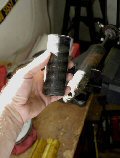 Photo courtesy of Newtin. Later models used a chrome steel cover to hide the rod  Photo courtesy of Newtin. |
Early models used a chrome steel cover to hide the rod  Photo courtesy of Newtin. Later models had a black plastic inner cover to hide the rod  Photo courtesy of Newtin. |
All used a black plastic inner cover to hide the rod  Photo courtesy of Newtin. |
||||
| V700 | V7 Special | Ambassador | 850 GT | 850 GT California | Eldorado | 850 California Police | |
| Seats |
Dual seat. If used in police service, a solo seat was likely fitted. |
Dual seat. If used in police service, a solo seat was likely fitted. |
Dual seat. If used in police service, a solo seat was likely fitted. |
Dual seat. If used in police service, a solo seat was likely fitted. |
Buddy seat. |
Dual seat. If used in police service, a solo seat was likely fitted. |
Solo seat. |
| V700 | V7 Special | Ambassador | 850 GT | 850 GT California | Eldorado | 850 California Police | |
| Foot rests |
Foot pegs. |
Foot pegs. If used in police service, footboards were likely fitted. |
Foot pegs. If used in police service, footboards were likely fitted. |
Foot pegs. If used in police service, footboards were likely fitted. |
Footboards. |
Foot pegs. If used in police service, footboards were likely fitted. |
Footboards. |